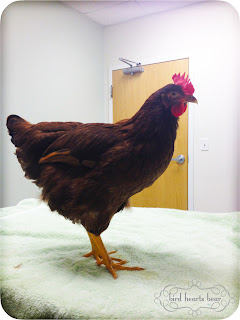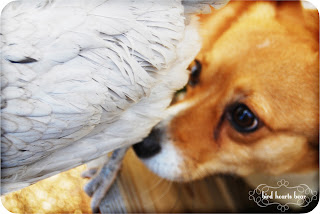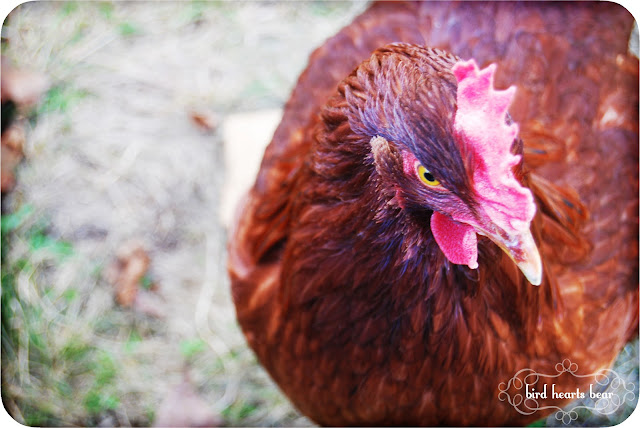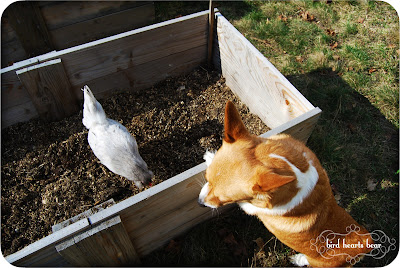With Rosie's prolapse showing no signs of getting better, and having reached the end of our knowledge in treating her, we decided to take Rosie in to the vet. Luckily for us there is a vet within 30 minutes of us who treats chickens and came highly recommended by some friends of ours.
We gave Rosie her (now)customary bath and blow dry and packed her in the car. She was a very good passenger and pretty much just chilled out the whole ride there.
We gave Rosie her (now)customary bath and blow dry and packed her in the car. She was a very good passenger and pretty much just chilled out the whole ride there.

There were a few dogs that came over to say "hello" when we sat down in the waiting area. Luckily no one was feeling aggressive and everyone was just curious about each other.

The vet, Dr. Robinson, was very good with Rosie. We explained that she's been prolapsed for three days, resulting from trying to lay her very first egg, and that there seemed to be some sort of blockage there that we were hesitant to remove ourselves, not wanting to injure her.
Dr. Robinson cleaned her up and removed the blockage and some dead tissue, and her vent immediately looked worlds better. He said he felt good about her potential for recovery because as soon as the tissue and blockage were gone, she started pulling the prolapse back into herself.
Dr. Robinson cleaned her up and removed the blockage and some dead tissue, and her vent immediately looked worlds better. He said he felt good about her potential for recovery because as soon as the tissue and blockage were gone, she started pulling the prolapse back into herself.

What's wrong with my butt?
After pushing the rest of the prolapse back in and applying some antibiotic ointment, Dr. Robinson threw in a couple sutures to hold everything in place while it heals. Throughout the entire examination and suturing, Rosie made not one peep. She didn't struggle, she didn't squawk, and Dr. Robinson and his assistant said that she was one of the best-behaved chickens they've ever treated. She didn't even require sedation when he was suturing her.
She's such a sweet little hen.
We're hoping to keep her sutures in for about a week, longer if we can manage, to give her time to heal and for the swelling to go down. We have her back in the big brooder in the living room, this time covered and blocked from the light to discourage further laying. If she does start to lay an egg while the sutures are still in, they'll have to be removed immediately so she doesn't tear. We also have Preparation H and Vetericyn handy to help with keeping the swelling down and protecting against infection.
I'm so proud of my little Rosie-bird. And I'm so relieved to have gotten her looked at by the vet. For our piece of mind and her health, it was totally worth the $95. We'll have to be vigilant about checking her for prolapse for the rest of her life, as once it happens, it's prone to reoccurring. I'm hopeful that since she's so young and we caught it early and got it treated, that she'll heal up well and won't prolapse again. Fingers crossed!
Bird Hearts Bear
UPDATE!!! 3/4/13
Rosie is officially reintegrated into the flock. We removed her prolapse sutures Saturday night and kept her inside for observation until Sunday. Her vent is looking very good, and the prolapse has not recurred, much to my relief. She hasn't started laying again, but I'm not worried.
Although she has lost her status as the alpha hen, she is still trying to assert her dominance against Ruth. Ruth is proving to be an excellent leader, protecting the other hens from Rosie and putting Rosie in her place without injuring her.
Although she has lost her status as the alpha hen, she is still trying to assert her dominance against Ruth. Ruth is proving to be an excellent leader, protecting the other hens from Rosie and putting Rosie in her place without injuring her.
Ponyo is becoming quite hen-pecked by the girls. She'll come outside with us when we go check on the chickens, but she stays very close since the hens will chase her around the yard and peck at her. I feel bad for her, but she did mercilessly harass them the entire time they were growing up in their brooder. I'm hoping she'll be able to assert herself enough to reach something of a truce with the chickens. Otherwise we'll probably fence off the back half of the yard for the chickens, so Ponyo has some space to herself.

Marie has been laying somewhat steadily for us. Her egg size fluctuates, but her body seems to be dialing it in. Soon I'll have pictures of a lovely bowl full of blue eggs to share with you.
She is by far our most sociable chicken. Anytime we come outside, she immediately runs up to us and follows us around the entire time we're there. Today, I perched on the edge of the raised beds and she hopped right up. Ponyo helpfully inspected her vent to make sure she's not having any prolapse issues.

"Nope, this one's butt is fine."

Marie has been laying somewhat steadily for us. Her egg size fluctuates, but her body seems to be dialing it in. Soon I'll have pictures of a lovely bowl full of blue eggs to share with you.
She is by far our most sociable chicken. Anytime we come outside, she immediately runs up to us and follows us around the entire time we're there. Today, I perched on the edge of the raised beds and she hopped right up. Ponyo helpfully inspected her vent to make sure she's not having any prolapse issues.

"Nope, this one's butt is fine."
She did figure out she can hop in to the raised bed, and began scratching around for bugs and scraps. I think it's the first time she's done that, she seemed quite surprised. Mr. Bear will be building a greenhouse around the beds, so I'm not so worried about them figuring out how to hop up there.
At four months, Ada has become quite a flashy hen. I love her feathers! She seems to have given up her quest to be the alpha hen, and is content to run around the yard and stalk Ponyo when she's out. Neither she nor Ruth have shown any signs of laying yet. Mr. Bear and I regularly check the yard for wayward eggs, though I hope since Marie took to laying in the nest box immediately that the others will, too.
Oh, the fluffy chicken butts...
Marie showed Ruth how to get into the raised bed.
After researching vent prolapses like Rosie's, I had become very very fearful, since so many of the stories ended in tragedy. I am so very happy that things have worked out well for Rosie, I would have been so sad to have lost her after only having her for a few short months.
Things I have learned from Rosie's prolapse:
Things I have learned from Rosie's prolapse:
- Have a chicken first-aid kit on hand. Ours is stocked with hemostats, small snipping scissors, Vetericyn, Preparation H, bandages, epsom salt, electrolytes and gloves.
- Chickens are both more delicate and tougher than we think. We could have removed that troubling tissue on our own, but having never done something like that before, we were too wary to do so. Should something like that happen again, we now know that it's okay to attempt to remove the tissue ourselves. The Chicken Chick has a great post on how to treat a prolapse. I followed her advice, but since Rosie's prolapse looked so different, I opted to take her to a vet just in case.
- Know where the nearest vet who will treat chickens is to you. I feel so much better knowing that we have a good vet who knows his chickens near enough that we can get the girls to him without too much hassle.
- Enjoy your chickens everyday! They won't be with you forever.
Bird Hearts Bear








